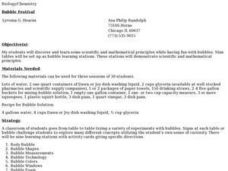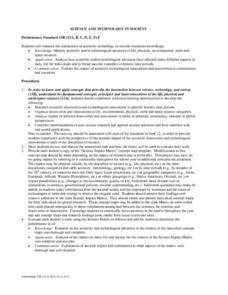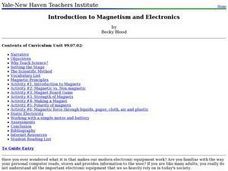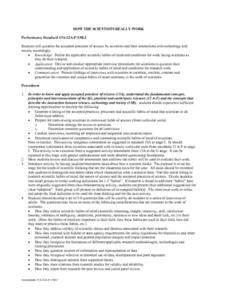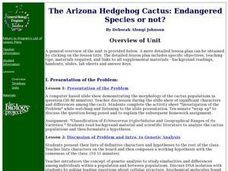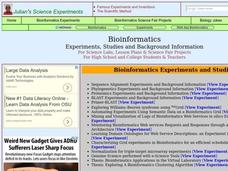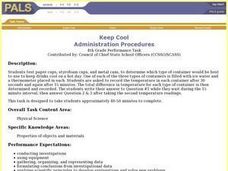Curated OER
Spin, Spin, Spin That Body!: Figure Skating, Physics, Science, Winter Sports, Olympics
Students learn the scientific principles of centripetal force through research and experimentation.
Curated OER
Keep Your Bubbles Up
Students investigate design and the correct use of technology. In this chemistry lesson, students investigate the Bernoulli Principle using hands on bubble making. They link the principle that keeps the bubble aloft to the BP principle.
Curated OER
Me and My Shadow
Students apply the process of scientific inquiries or technological design to explore the explanations of the daily patterns of the Earth's rotation. They record different shadow lengths showing the apparent movement of the sun through...
Curated OER
Draw Me a Mammal!
Fifth graders illustrate at least three art elements in a drawing of a mammal they've read about with 100% accuracy. As a review, Bloom's Taxonomy questions are asked as they prepare to sketch something they pictured in the story they read.
Curated OER
Bubble Festival
Young scholars practice scientific inquiry while learning about bubbles. In this lesson about bubbles, students explore characteristics of bubbles. Young scholars move through nine different "bubble" stations following directions and...
Curated OER
Acids and Bases: Together again!
High schoolers identify principles behind acid-base reactions. They predict factors that may affect an acid-base reaction. Students identify questions and concepts that guide scientific investigations.
Curated OER
Creeping Sheets of Ice
Students conduct scientific investigation in which they observe glacial
effects on landscape, develop and explain their own theories of how glaciers change land, and demonstrate understanding and explain basic motion and force principles.
Curated OER
SCIENCE AND TECHNOLOGY IN SOCIETY
Students research scientific discoveries and technological innovations. They organize discoveries and innovations in life, environmental, physical, earth and space science categories. They analyze impact of selected discoveries and...
Curated OER
Rock-A-Bye Pendulum
Third graders analyze the effects of force on an object in motion and its relationship to a change in speed. This lesson uses a pendulum to demonstrate the principle.
Curated OER
Discovering Dichotomous Keys
Students become familiar with the structure and use of dichotomus keys. They demonstrate a comprehension of the fundamental principles of taxonomy by classifying organisms from a local ecosystem. Students are introduced to the term...
Curated OER
Introduction to Magnetism and Electronics
Students are introduced to the concepts of magnetism and electronics. As a class, they walk through the steps of the scientific method and define new vocabulary. In groups, they are given a bag of objects and they are to separate them...
Curated OER
How The Scientists Really Work
Students question the accepted practices of science by scientists and their interactions with technology and society. They devise and conduct appropriate interview procedures for scientists to question their understanding and...
Curated OER
Science Safari: Energy Resources
Learners discover how scientific methods are integral to the creation of energy. In this energy resources lesson, students follow the provided procedures to learn how science impacts energy production.
Curated OER
Using Models to Communicate
In this models worksheet, students read about how models are used to communicate events or principles in science. They are given an example and answer 4 questions about models. They discuss accuracy and inaccuracy of models. They create...
Curated OER
The Arizona Hedgehog Cactus: Endangered Species or not?: Biology, Plants
In this lesson students will study the: "Classification of Echinocereus triglochidiatus and Geographical Ranges of its Varieties." Students read background material and scientific literature to analyze the cactus populations and then...
Curated OER
Wilderness Survival: A Field Practicum
Students are provided with hands-on-field testing of authentic applications from principles pertaining to: Psychology A. Develop a positive, can-do attitude with a high degree of self-reliance that is transferable to human interactions...
Curated OER
Wilderness Survival: A Field Practicum
Students use hands-on field-testing of authentic application from principles pertaining to: Psychology- A. Develop a positive, can-do attitude with a high degree of self-reliance that is transferable to human interactions outside of the...
Curated OER
Science: Invent a Gadget
Third graders invent gadgets using simple machine principles. Once they have assembled graphic organizers containing information about their invention, they draw diagrams and explain how their gadget works. Lastly, 3rd graders write...
Curated OER
Paper Airplane Contest
Students research principles of flight. They design their own paper airplanes and make predictions about the performance of different designs. Students keep track of their findings in an electronic journal.
Curated OER
Scientist/ Webelos Activity Book
In this physical science instructional activity, students write short responses for each scientific law in 14 different questions to obtain a merit badge.
Curated OER
Dr. Climatic
Students examine the principles that are involved in climate change. In this environment instructional activity students view a presentation on climate change and complete a handout.
Curated OER
Bioinformatics
Students conduct a series of scientific investigation using bioinformatics. In this molecular biology activity, students collect experimental data using different educational softwares. They calculate and analyze relationships using...
Curated OER
Pulse
Students determine a baseline pulse rate then chart the changes in rate with exercise. They describe the changes and develop a rationale for their observations. The task assesses students' abilities to make simple observations, determine...
Curated OER
Keep Cool
Learners design an experiment to determine which type of container would be best to use to keep drinks cool on a hot day. Students test paper cups, styrofoam cups, and metal cans by filling them with ice water and they use a thermometer...






